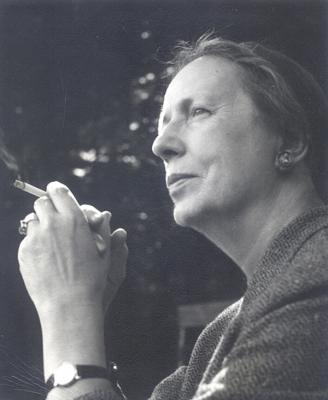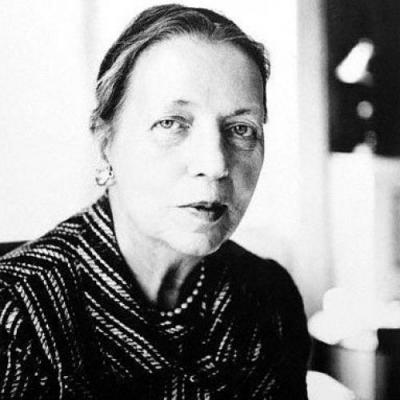A Poet’s Prose, Selected Writings of Louise Bogan, edited by Mary Kinsie, was published by Swallow Press in 2005. Because previous editions of Bogan’s prose and criticism are out of print, Kinzie’s edition was a most welcome arrival at that time, since she also included Bogan’s unpublished poems and drafts. About her choices for inclusion, Kinzie wrote, “What follows is limited by the fact that selections from three books, two of them longer than four hundred pages, plus the uncollected fiction and poetry had to appear in one book. Some choices were difficult, but all were guided by a desire for breadth in both topic and tone.”
 But the exclusion of Bogan’s piercing short essay, “The Springs of Poetry,” is a stunning omission. It is the one essay by Bogan included in Twentieth-Century American Poetics, (McGraw-Hill, 2004, edited by Dana Gioia, David Mason and Meg Schoerke), an apt representative choice, since this brief essay illuminates so much of Bogan’s creative psyche. “The poem is always the last resort” is both revelation and admonition.
But the exclusion of Bogan’s piercing short essay, “The Springs of Poetry,” is a stunning omission. It is the one essay by Bogan included in Twentieth-Century American Poetics, (McGraw-Hill, 2004, edited by Dana Gioia, David Mason and Meg Schoerke), an apt representative choice, since this brief essay illuminates so much of Bogan’s creative psyche. “The poem is always the last resort” is both revelation and admonition.
Also missing from the Kinzie book is “Formal Poetry” (1953), the one Bogan prose piece included in Reginald Gibbons splendid collection, The Poet’s Work (Houghton Mifflin, 1979), a favorite book of essays on poetry.
“The Springs of Poetry” dates from 1923 when it was published in The New Republic. Bogan was most productive in the 20’s and 30’s, and this essay reflects the heat of early immersion in and discovery of her creative motives and instincts. Here it is, below, with its now quaint final reference to Alice Meynell.
* * * * * * * * *
The Springs of Poetry
When he sets out to resolve, as rationally as he may, the tight irrational knot of his emotion, the poet hesitates for a moment. Unless the compulsion be absolute, as is rarely the case, the excitement of the resolution sets in only after this pause, filled with doubt and terror. He would choose anything, anything, rather than the desperate task before him: a book, music, or talk and laughter. Almost immediately the interruption is found, and the emotion diverted, or the poem is begun, and the desperation has its use.
The author of the Poetica recognized this necessary intensity when he wrote that distress and anger are most faithfully portrayed by one who is feeling them at the moment, that poetry demands a man with a special gift for it, or else one with a touch of madness in him. Few poems are written in that special authentic rage because even a poet has a great many uses for grief and anger, beyond putting them into a poem. The poem is always a last resort. In it the poet makes a world in little, and finds peace, even though, under complete focused emotion, the evocation be far more bitter than reality, or far more lovely.
Sometimes the poet does not entirely succeed in diverting his energies. He expresses himself, determined to take a holiday from any emotion at all, being certain that to hear, see, smell and touch, merely, is enough. His hand has become chilled, from being held too long against the ground to feel how it is cold; his mind flinches at cutting down once again into the dark with the knife of irony or analysis.
So he writes a poem at third, fourth, or fifth hand, bred out of some delicate fantastic ruse of the brain. Even at its best a poem cannot come straight out of the heart, but must break away in some oblique fashion from the body of sorrow or joy, — be the mask, not the incredible face, — yet the synthetic poem can never be more than a veil dropped before a void. It may sound, to change the images, in ears uninitiate to the festival, but never to those, who, having once heard, can recognize again the maenad cry.
It would seem best, in order that this temptation to second-rate work be kept negligible, that for long periods the poet himself be his only audience. He has no business with the shifting criteria with which each little year would charge him. He should have no thought of a descending scale of editors to whom his best and his worst may be fed.
 One would wish for the poet a stern countryside that could claim him completely, identify him rigidly as its own under the color of every season. He should be blessed by the power to write behind clenched teeth, to subsidize his emotion by every trick and pretense so that it trickle out through other channels, if it be not essential to speech, — blessed too, by a spirit as loud as a houseful of alien voices, ever tortured and divided with itself. And most completely blessed by that reticence celebrated by the old prophetic voice: “I kept silent, even from good words … the fire kindled, and at the last I spoke with my tongue.” Under the power of such reticence, in which passion is made to achieve its own form, definite and singular, those poems were written that keep an obscure name still alive, or live when the name of their author is forgotten. Speaking thus, as though the very mind has a tongue, Yeats achieves his later work: poems terribly beautiful, in which the hazy adverbial quality has no place, built of sentences reduced to the bones of noun, verb, and preposition.
One would wish for the poet a stern countryside that could claim him completely, identify him rigidly as its own under the color of every season. He should be blessed by the power to write behind clenched teeth, to subsidize his emotion by every trick and pretense so that it trickle out through other channels, if it be not essential to speech, — blessed too, by a spirit as loud as a houseful of alien voices, ever tortured and divided with itself. And most completely blessed by that reticence celebrated by the old prophetic voice: “I kept silent, even from good words … the fire kindled, and at the last I spoke with my tongue.” Under the power of such reticence, in which passion is made to achieve its own form, definite and singular, those poems were written that keep an obscure name still alive, or live when the name of their author is forgotten. Speaking thus, as though the very mind has a tongue, Yeats achieves his later work: poems terribly beautiful, in which the hazy adverbial quality has no place, built of sentences reduced to the bones of noun, verb, and preposition.
This is the further, the test simplicity, in the phrase of Alice Meynell, sprung from the passion of which every poet will always be afraid, but to which he should vow himself forever.